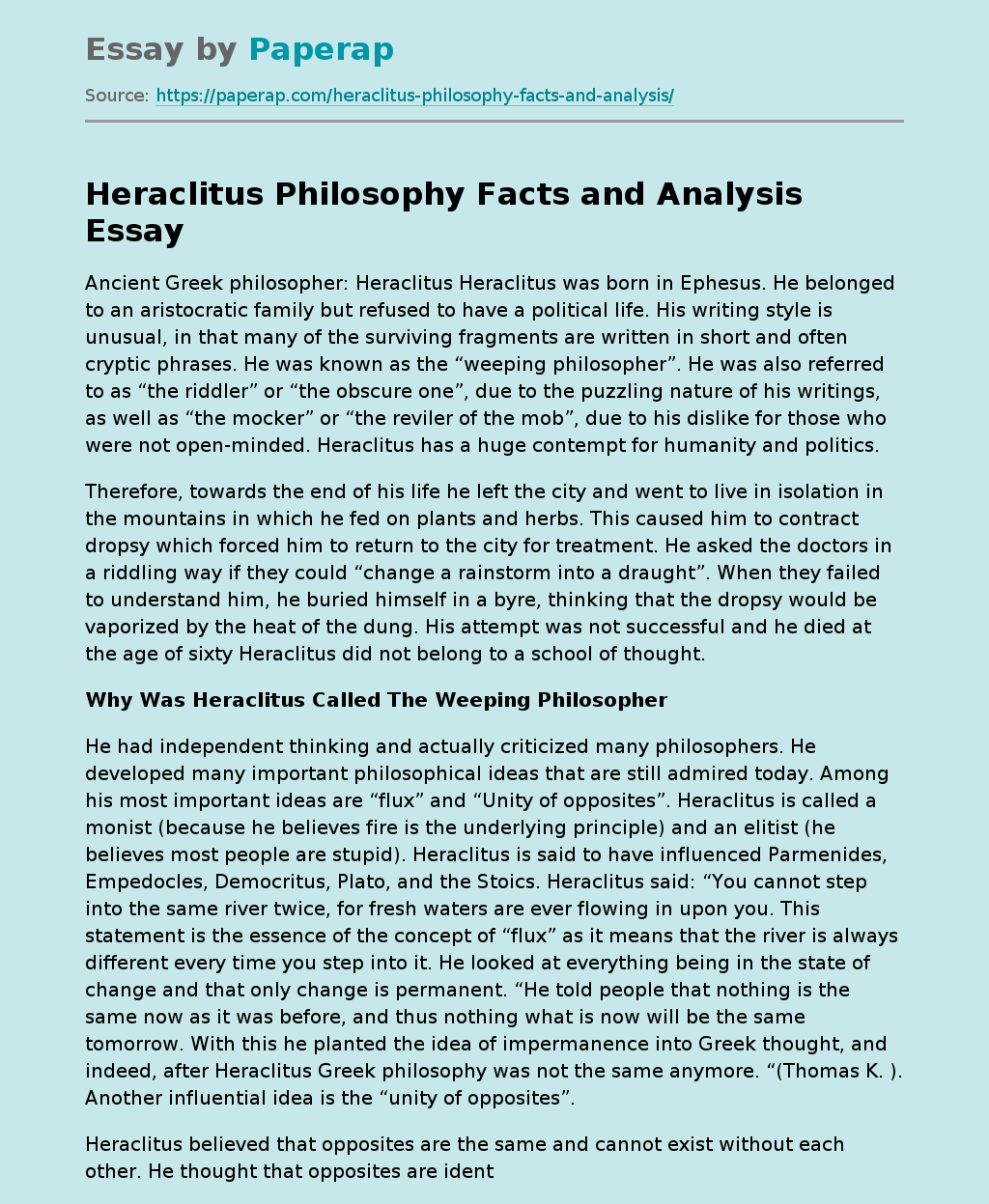Heraclitus Philosophy Facts and Analysis
Ancient Greek philosopher: Heraclitus Heraclitus was born in Ephesus. He belonged to an aristocratic family but refused to have a political life. His writing style is unusual, in that many of the surviving fragments are written in short and often cryptic phrases. He was known as the “weeping philosopher”. He was also referred to as “the riddler” or “the obscure one”, due to the puzzling nature of his writings, as well as “the mocker” or “the reviler of the mob”, due to his dislike for those who were not open-minded.
Heraclitus has a huge contempt for humanity and politics.
Therefore, towards the end of his life he left the city and went to live in isolation in the mountains in which he fed on plants and herbs. This caused him to contract dropsy which forced him to return to the city for treatment. He asked the doctors in a riddling way if they could “change a rainstorm into a draught”. When they failed to understand him, he buried himself in a byre, thinking that the dropsy would be vaporized by the heat of the dung.
His attempt was not successful and he died at the age of sixty Heraclitus did not belong to a school of thought.
Why Was Heraclitus Called The Weeping Philosopher
He had independent thinking and actually criticized many philosophers. He developed many important philosophical ideas that are still admired today. Among his most important ideas are “flux” and “Unity of opposites”. Heraclitus is called a monist (because he believes fire is the underlying principle) and an elitist (he believes most people are stupid).
Heraclitus is said to have influenced Parmenides, Empedocles, Democritus, Plato, and the Stoics. Heraclitus said: “You cannot step into the same river twice, for fresh waters are ever flowing in upon you. This statement is the essence of the concept of “flux” as it means that the river is always different every time you step into it. He looked at everything being in the state of change and that only change is permanent. “He told people that nothing is the same now as it was before, and thus nothing what is now will be the same tomorrow. With this he planted the idea of impermanence into Greek thought, and indeed, after Heraclitus Greek philosophy was not the same anymore. “(Thomas K. ). Another influential idea is the “unity of opposites”.
Heraclitus believed that opposites are the same and cannot exist without each other. He thought that opposites are identical. For instance, to Heraclitus, hot and cold are the same. Heraclitus saw unity as being harmony. To modern people, it seems silly to assume that opposites are identical but to the Greek, it completely makes sense. Hot and cold can both be expressed as a level of temperature, dark and bright as a degree of light. This is why opposites cannot exist without each other because when you say something is hot, it should be hot in comparison with something colder.
The ideas of “flux” and “unity of opposites” are somehow connected to each other. It is sometimes argued that Heraclitus’ quote: “You cannot step into the same river twice, for fresh waters are ever flowing in upon you. ” Is actually referring to the unity of opposites because the river is the same but at the same time it is different because new fresh waters flow on it. To conclude, Heraclitus was a very independent thinker and a huge critic of everything around him. His puzzling writings and deviant thoughts made him popular and influential among the later philosophers.
His ideas of flux and the unity of opposites are still admired by today’s philosophers. Unfortunately, not all his writings survived the years and only fragments of his writings exist. As much as we write about Heraclitus and try to understand him, in the end “Much learning does not teach understanding”.
References:
1. website name and author are unknown, http://home. wlu. edu/~mahonj/Ancient_Philosophers/Heraclitus. htm
2. Thomas Knierim, “Heraclitus”,http://www. thebigview. com/greeks/heraclitus. html, 3. N. S. Gill, About. com, http://ancienthistory. about. com/od/philosophers/g/Heraclitus. htm
Heraclitus Philosophy Facts and Analysis. (2019, Dec 05). Retrieved from https://paperap.com/heraclitus-philosophy-facts-and-analysis/

